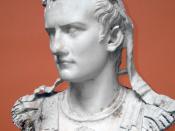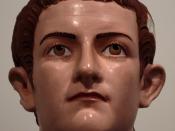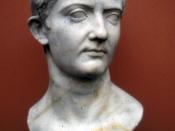The Madness of Gaius Caligula of Rome
The madness of Caligula is a well-known fact. The very mention of his name conjures up visions of madness, cruelty, viciousness and sexual perversion. Unlike Hitler or Stalin, who were committed to policy and consistent in their ruthlessness, there was no predicting what Caligula may do next (Ferrill, as paraphrased in Bootikins, 1991). Many factors may have contributed to his madness: lead poisoning, heredity, disease, and observationally learned behavior.
Born in 12 AD as Gaius Augustus Germananicus, he was affectionately nicknamed Caligula or "Little Boots" by the roman soldiers under his father's command, a well-known general. His uncle, Emperor Tiberius, murdered Caligula's family, except for his two sisters. Emperor Tiberius thus summoned the orphaned Caligula to join him on the island of Capri. In March 37AD, the emperor fell ill and subsequently collapsed into a coma. An accepted belief is that Caligula's chamberlain smothered the Emperor.
Thus, with great fanfare and optimism, on March 28, 37AD Caligula was appointed emperor. His first actions as emperor were positive: freedom for prisoners, amnesty for exiles, and no more treason trials. In October of 37AD Caligula fell ill and nearly died. Upon his recovery, his true madness began to manifest itself. After a four-year reign, Caligula's death came in the form of a stabbing as he left a theater (McGill, 2002). Many factors contributed to Caligula's behavior, both environmental and hereditary. The bias of history makes the surmising of the exact facts and circumstances concerning Caligula's behavior impossible, but it is possible to reach reasonable conclusions. Most differences about Caligula's behavior derive from the disagreements among those who subscribe to differencing schools of thought concerning behavior. "Some Contemporary historians have hypothesized that Caligula's illness drove him mad. Others attribute his radical behavior to his troubled youth...


